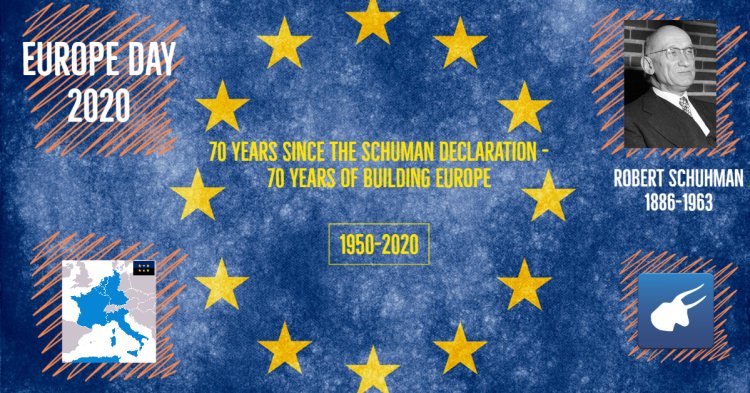Since the day of his declaration, on 9th May 1950, a spirit of unity and of solidarity has united our societies. We built the Coal and Steel Community, the common market, the European Community and then the European Union. Aside from Brexit, our community has grown continuously, from six members in 1957 to 27 in 2020, waiting, maybe, for others to join us.
Thinking about everything we did together, one cannot help think about what Europe was in the 1930s, and especially in 1945, torn apart and wounded by a nationalism all the more absurd for the fact that the expression of hatred targeted fellow Europeans, sharing the same history.
As Schuman wrote, “Europe [was] not made all at once, or according to a single plan. It [was] built through concrete achievements”. The coming together of European nations demanded the elimination of the secular opposition between France and Germany, and eliminated it was. Europe was built on this basis. A united Europe, which strove to assert itself on the international scene.
Today, Europe and the world are facing challenges which are much different from the ones we were facing in 1950. European peace is guaranteed thanks to a single market which made war “materially impossible”. The emergence of a European democracy, through the European Parliament, made a martial spirit completely anachronical. Yet, a threat as existential as war and nationalism is hanging over us, consuming slowly but steadily our common living environment: the climate crisis.
We, European federalists, think that the principle of subsidiarity – whereby problem resolution must be made at the most appropriate governance level, whether local, national, European or global – must lead the response to any societal challenge. Moreover, we think that citizens and civil society must have their say in policymaking, regardless of the governance level concerned.
The climate crisis is a transnational and transcontinental threat, although its consequences will particularly be felt in the poorer global South, where the citizens will be the first victims. Floods, droughts, tornados and rising ocean levels do not know borders. Whether in Paris, Athens, Helsinki, New York, Kinshasa or the Vanuatu Islands, we all are vulnerable to climate change. This is why we consider it essential to address this issue not only at the European level but also and above all at the global one, while reflecting on the local implications of these disruptions.
The European Union has developed climate change and energetic transition policies, while encouraging a coordinated and incentivising action at the global level.
The architecture that the UN has progressively implemented from the end of the 1980s and the beginning of the 1990s is the only global strategy used so far to address the climate issue. The United Nations Framework Convention on Climate Change (UNFCCC) of 1992 is the text on which the organisation of COPs, the 1997 Kyoto Protocol and the 2015 Paris Agreement are based.
The global climate architecture has thus been built on the governments’ will, in a “Westphalian” spirit of international relations, sending delegates to negotiate the different so-called “binding” agreements, but which do not modify the sacrosanct principle of sovereignty in any way (when a country does not want to lose even the smallest amount of sovereignty, it withdraws from its commitments, as did the United States from the Paris Agreement or Canada from the Kyoto Agreement).
The gulf between the considerable financial and political means provided and the lack of concrete results (given that the concentration of carbon dioxide keeps increasing) highlights the necessity of changing how we proceed, for the benefit of all citizens. Furthermore, global civil society has almost no access to the decisions taken during the COP negotiating sessions. The reports of the Intergovernmental Panel on Climate Change (IPCC) are also tinged with intergovernmentalism and are not sufficiently accessible to the citizens of the planet.
Therefore we, European and federalist citizens, want to propose two concrete measures to attempt a reorientation of how climate policies are discussed at the international level. First and foremost, citizens must be granted a much more important role during the elaboration of the declarations and agreements negotiated during the COPs. The effects of climate change will affect citizens as much as state structures. A democratic debate at the global level, including all state actors, citizens and international organisations, must take place without further delay.
The second proposal concerns the reports of the IPCC, the “Bible” of knowledge of climate sciences, whose first report published in 1990 led to the Rio Summit in 1992 and the ratification of the Climate Convention. It is essential that the IPCC – which is both a scientific and political body (intergovernmentalism is the rule) – gives more space to the citizen and democratic dimension of climate change in its reports, especially in dedicating a specific report to the adaptation of societies and of democracy to climate change. This approach to climate change, more based on humanities, will outline not only everyone’s vulnerability, but also all local implications of a problem often perceived as remote.
We thus call the European Union to fully implement its “European Climate Pact” in the framework of its Green Deal, as well as to make good use of its climate diplomacy to support an increased role of global civil society in the UN bodies mentioned above.



Follow the comments: |
|
